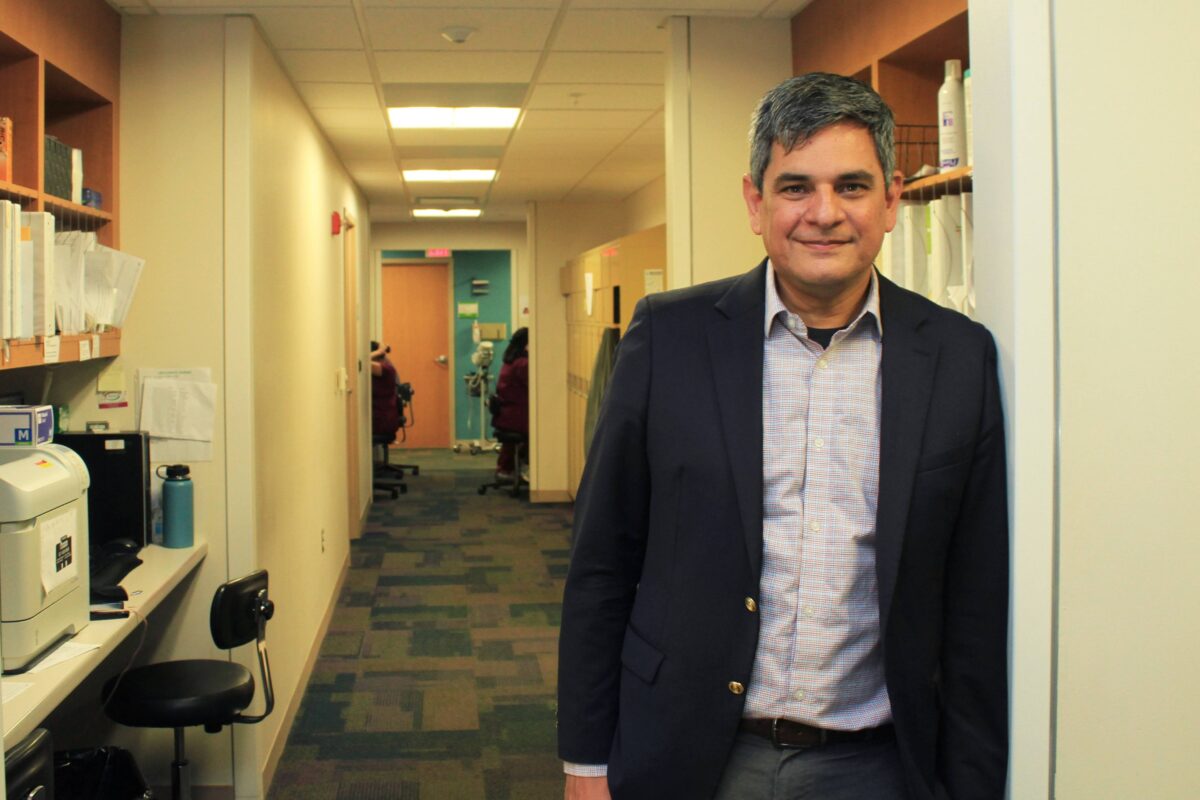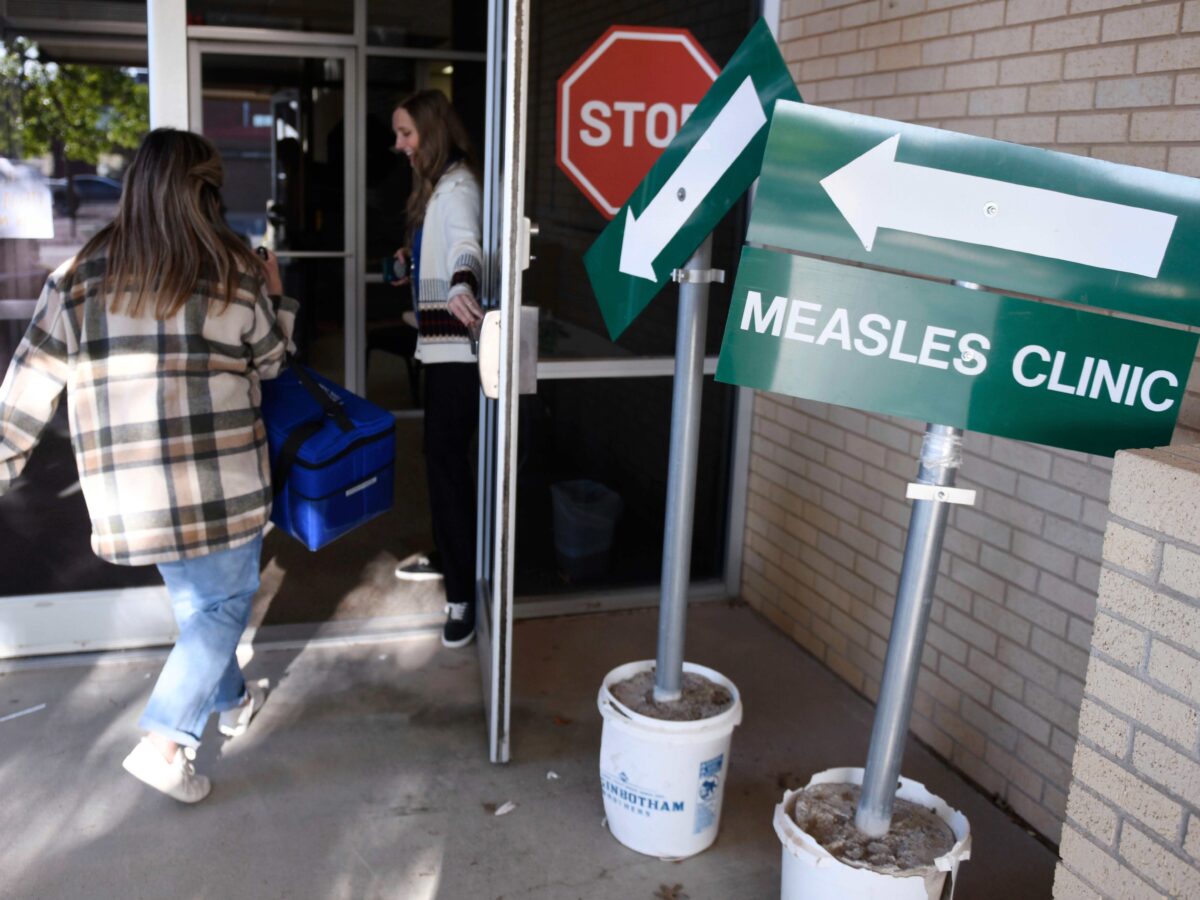Overview:
-More than 2.6 million Michiganders access health insurance through Medicaid, according to the state.
-That's roughly one quarter of the state's population.
-“It is going to be devastating, not only here, but for health centers across the country,” said Dr. Felix Valbuena Jr., CEO of the Community Health and Social Services Center in Southwest Detroit.
The health care of hundreds of thousands of Michiganders could be at risk following the passage of President Donald Trump’s One Big Beautiful Bill Act, which threatens to impact residents across the state as well as the local providers that may struggle to serve them due to reduced operating budgets.
The Citizens Research Council of Michigan projects that as many as 200,000 people in Michigan will lose their direct insurance coverage through Medicaid, the federal-state insurance program that provides health and long-term care to millions of Americans. The law could result in Michigan losing $2 billion in federal funding over the next decade, the report said.
“It is going to be devastating, not only here, but for health centers across the country,” said Dr. Felix Valbuena Jr., CEO of the Community Health and Social Services Center, or CHASS, a community health center in Southwest Detroit.
More than 2.6 million Michiganders access health insurance through Medicaid, according to the state. That’s roughly a quarter of Michigan residents.
“People are going to get sicker. They’re going to end up in situations where these chronic conditions are out of control, and costing the health system more than if Medicaid was still around,” Valbuena told Planet Detroit.
Nearly half (47%) of CHASS’s annual 11,000 patients are covered by Medicaid, Valbuena said. Community health centers like CHASS are reimbursed by Medicaid through a prospective payment system for services provided to Medicaid beneficiaries, enabling them to pay for medical care as well as wraparound services like transportation and outreach.
“We have dentists, we have an in-house pharmacy, we have integrated behavioral health, we have nutritionists, we have community health workers, we have doulas for pregnant women,” Valbuena said.
“All of those things are benefiting our community and keeping our community healthy and well so they can go to work, they can go to school and do what they need to do.”
MORE REPORTING FROM PLANET DETROIT
How do transportation struggles affect the health of Detroiters? New project aims to find out
In Detroit, where public transit often falls short, journalist Eleanore Catolico will investigates how lack of reliable transportation impacts health care access for older adults, people with disabilities, and those managing chronic conditions, through a partnership with Planet Detroit’s Neighborhood Reporting Lab and the USC Annenberg Center for Health Journalism.
Measles outbreak the worst in US for more than 3 decades
Detroit and the counties of Oakland, Macomb, and Wayne are far below the 95% community vaccination rate the CDC says is needed to prevent measles outbreaks.
Immigration crackdown’s health effects: ‘Like a roller coaster’
A Venezuelan couple describes navigating life in Michigan in an uncertain environment for immigrants. The executive director of Ypsilanti’s Corner Health Center says public health impact of immigration crackdown by Trump administration will be felt “for a generation.”
Medicaid expansion transforms health care landscape
Medicaid has taken on a larger role in Michigan health coverage over the last two decades, with upticks in enrollment coinciding with economic downturns during the Great Recession and the COVID-19 pandemic, according to the Citizens Research Council report.
In 2014, Michigan launched the Healthy Michigan Plan, its expansion program, which opened the door for low-income Michigan residents between the ages of 19 and 64 to receive Medicaid benefits. Up until that point, the subgroup of working-age adults could not qualify for traditional Medicaid or Medicare.
One 2018 study found that less than two years after Michigan expanded Medicaid, the average amount of medical bills in collections for enrollees dropped by over $500. Enrollees were 11% less likely to be evicted, and 13% less likely to overdraw their credit cards than before the expansion.
Valbuena credits the Medicaid expansion with drastically cutting down the number of uninsured patients at CHASS.
“We used to have meetings nationally with colleagues about how to keep your doors open with 86% of your patient population uninsured,” he said.
“When the Affordable Care Act came out and expanded Medicaid, we got down initially to about 60%-62%. This past year, we got down to 37% uninsured.”
Those numbers reflect decreases in the uninsured rate nationwide, a result, experts say, of the expansion of Medicaid. Death rates and hospital stays reportedly declined as a result, and more Americans reported taking advantage of available health care resources and an improvement in their health.
Medicaid cuts threaten health care providers
Medicaid funding goes toward the operations budget of hospitals, community health centers, and nursing homes, either through direct payments, or the Medicaid provider tax program, which allows states to maximize their health care funding by taxing providers instead of residents. The federal cuts have the potential to close health care institutions in the state, particularly in rural areas and small towns.
Valbuena said he and his team are “going department by department and looking at what we need to do” to stay financially stable, noting the health center may have to downsize some of its services.
As many as half of the people covered by the Healthy Michigan program have behavioral health conditions, including mental health disorders such as depression, or addiction to alcohol or drugs, according to research conducted by the University of Michigan Institute for Healthcare Policy and Innovation.
Mary Lee Pakieser is a family nurse practitioner based in Traverse City. Most recently, she’s addressed substance use disorder and harm reduction among homeless, incarcerated, and low-income individuals across Northern Michigan.
“If a lot of these patients lose Medicaid, they’re screwed. They’ll have no access to their providers. They won’t have access to medications,” said Pakieser, who estimates roughly 96% of the patients she sees are Medicaid beneficiaries.
“I’ve had a few patients who either lost Medicaid, lost regular insurance, or couldn’t get on Medicaid, and trying to help them pay for their meds is horrible, because there’s really no good programs out there. [Discount prescription service] GoodRx helps a teeny bit, but when you’re poor and broke and you don’t have access to Medicaid … yikes.”
In a 2019 journal article, the same team of researchers at U of M found that people with behavioral health conditions were more likely to report improvements in their physical health and ability to perform better at work after enrolling in Healthy Michigan than those without a condition.
Work requirements pose risk for Michiganders with chronic health problems
One of the greatest risks of the Medicaid cuts: the impact it will have on Michiganders living with multiple health conditions. Multiple studies outline the impact the expansion of Medicaid and health insurance coverage has on health outcomes and death rates, improving people’s access to care over time.
“We’ve seen much better evidence that gaining Medicaid coverage not only improves people’s health, but reduces their risk of dying, especially for middle aged adults with chronic health conditions like diabetes or high blood pressure or heart disease,” said Dr. John Ayanian, director of the University of Michigan Institute for Healthcare Policy and Innovation.
“If people start losing Medicaid coverage, particularly those who have one or more chronic conditions, we may see a reversal of those benefits and a rise in the risk of dying and mortality.”
Robert Schooner, 72, has been a regular patient at CHASS Center for over 45 years. As a Medicaid beneficiary, he uses the coverage to pay for follow-up treatments and medication for his heart condition.
“What (scares) me the most is that CHASS has been a real monument in the Southwest Detroit area,” said Schooner. “If this clinic was forced to close, people would suffer because the community relies on them for a lot of things.”
Central to the federal Medicaid cuts are the rollout of work requirements for Americans living in the 40 states that expanded their coverage of Medicaid via the Affordable Care Act. The expansion extends coverage to more than 700,000 Michiganders.
Under the work requirements slated to take effect in early 2027, Medicaid expansion recipients will need to prove they worked 80 hours a month in order to access coverage.
Although the requirement has exemptions for certain people, experts and health professionals warn the administrative burden of checking people’s work status could prompt fewer enrollees to stay on Medicaid.
As many as 55% of Medicaid enrollees nationally are employed in some capacity; 71% of Michigan adults enrolled in Medicaid work full- or part-time, according to the Kaiser Family Foundation.
“Insurance coverage helps them to maintain their employment, and many of them work in lower paying jobs that don’t offer health insurance coverage,” said the University of Michigan’s Ayanian.
There’s evidence to suggest a federal Medicaid work requirement would reduce the number of insured Americans and have limited effect on employment. Ayanian says one example is Arkansas, which between 2018 and 2019, became the first state to add a work requirement for Medicaid expansion recipients.
The result: as many as 18,000 people lost their coverage.
“Many people weren’t aware of the work requirement, or the systems for reporting that they actually were working were not very effective,” Ayanian said. “Many people lost their coverage even though they actually were working.”
In 2020, Michigan attempted to institute a similar work requirement for Healthy Michigan recipients, but the requirement was suspended in a federal court challenge in early 2020.
Detroit’s CHASS learns from past Medicaid challenges
Valbuena, the CEO of CHASS Center, said past experiences have prepared the health center for the worst.
In 2023, states were required to redetermine the eligibility of Medicaid recipients following the end of the COVID public health emergency. Nationally, more than 25 million people lost Medicaid, with about 69% of the cases occurring due to procedural issues, according to a report from the Center for Budget and Policy Procedures.
In Michigan, roughly 37% of Medicaid recipients were disenrolled, according to Kaiser Family Foundation data. At CHASS, it was 1%. Valbuena credits the community health center’s outreach and enrollment team with sending out community health workers to keep Medicaid patients continuously enrolled in the program.
In light of the coming work requirements, Valbuena said CHASS will do it again.
“If we need to get more staff to work on that, we’re going to do that,” he said. “We’re not going to let the administrative burden that the government wants people to have impact their ability to get Medicaid, to stay healthy, and to help us keep them healthy.”





